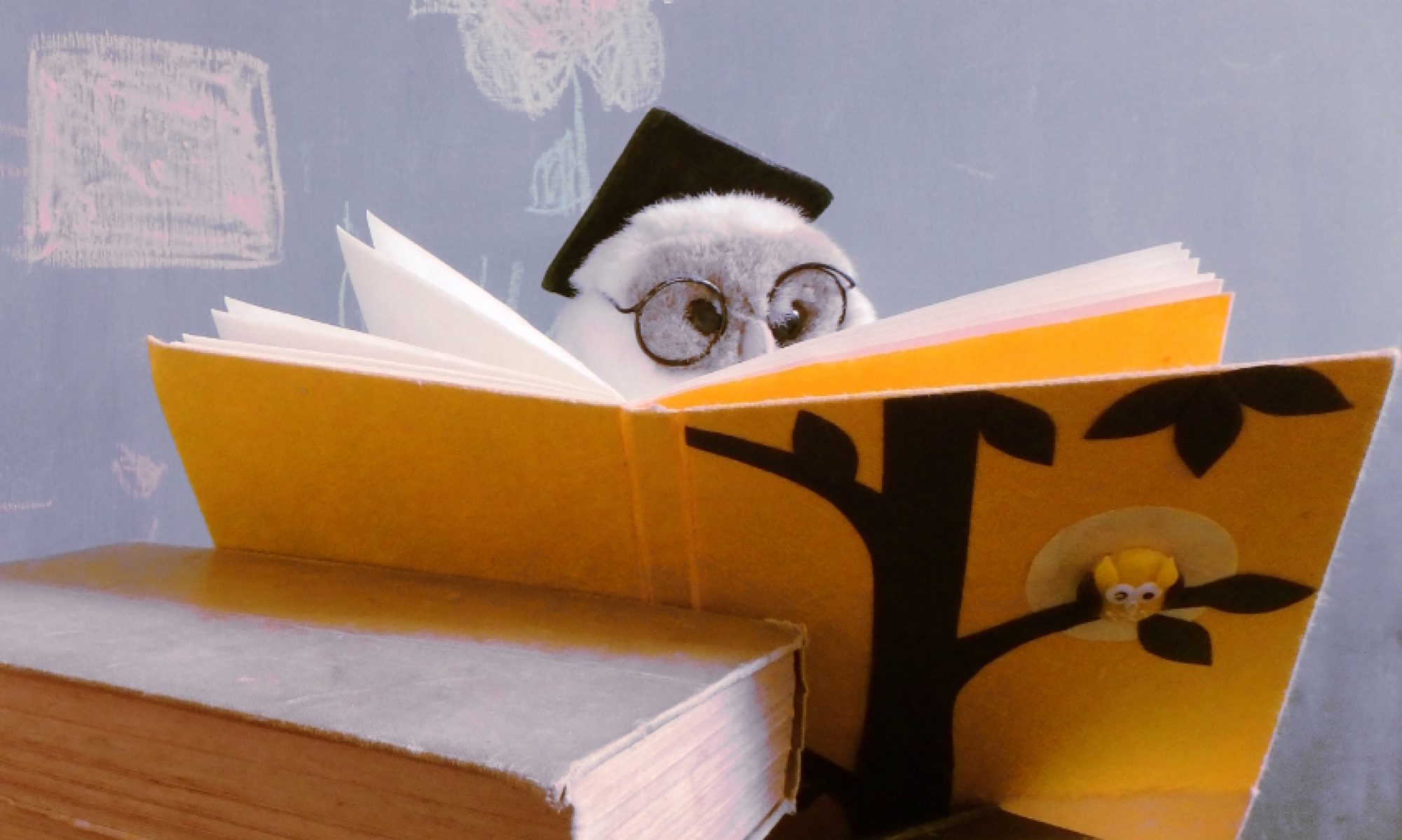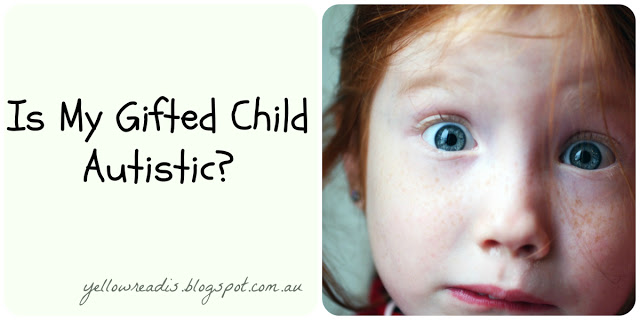“I’ve done lots of reading. I’ve looked at the standard definitions. I listened to the niggles and ‘problems’ that different people – my GP, a friend, my child’s teacher etc. have mentioned. I know my child’s quirky . . . But, is my gifted child autistic?”
It’s a question almost every parent of gifted kids I have ever talked to has brought up at one time or another (particularly the parents of highly to profoundly gifted children). And though it seems there should be an easy answer to this question – a quick test, a definitive way of putting a yes or no to this question, the answer is actually much, much more complicated.
Having travelled down this rabbit-hole for a long while now, I’d like take you on a trip into the world of giftedness and autism.
Gifted and Autistic? The Answer isn’t Clear-Cut
Firstly, despite lovely internet memes like this one[1], the answer isn’t as clear-cut. There are no easy-to-fill in lists, and there are so many overlapping characteristics that depend for their interpretation on the eye of the beholder. For instance, the difference between hyperlexia[2] and precocious reading – there is often no real clean-cut difference.
My own experience with my son is a good illustration. He was an extremely precocious reader – he was sight-reading words by his second birthday. But his comprehension of what he read varied depending on the topic. Factual material, even complicated scientific ideas were not just comprehended, but chewed and swallowed and reinterpreted. He really understood what he was reading (And still does. I have on more than one occasion found him immersed in reading some of our old college text-books).
But he struggled with fiction – stories that relied on interpreting emotional undertones went completely over his head. It wasn’t quite hyperlexia, but it was showing me he had problems understanding social interactions. But figuring out whether his emotional comprehension of material was age appropriate, hyperlexic, or a broader social comprehension problem?
That was far more difficult.
It can be hard to figure out where giftedness ‘stops’ and autism ‘starts’**. Or even if that is a sensible way to think about the problem.
** This piece specifically is focusing on gifted children. Just like gifted children are a small minority of the general population [2a], gifted autistics are a small minority of the autistic population.
Where to Start?
One of the first things to realise is that it’s going to take some serious professionally-qualified nous to answer this question.
Current research suggests that to even have a chance of getting the most accurate answer, you’re going to need not just a psychologist, but at a minimum, you will need to see a clinical, or educational and developmental psychologist. These are extra levels of qualification above the qualifications for a psychologist and they can take up to 10 years of additional study. It is also a really, really good idea to make sure that your chosen professional has experience with testing both gifted and autistic children [3].
But just doing an IQ test won’t cut it. According to research done at the Belin-Blank Centre at the University of Iowa, when they tested 81 gifted children, with half previously having been diagnosed as also autistic, they found that there was little to no difference in the IQ results for both groups.[4]
When IQ tests are the only pre-screening test used, it’s a good chance it will miss a lot of gifted autistics.
Picking the Right Test
In fact, according to this research, the only set of tests currently available that were able to reliably screen for most (but not all) gifted autistic children was the full ADOS (Autism Diagnostic Observation Schedule [5][5a]), and in particular, the BASC-2 (Behavior Assessment System for Children [6][6a] and the Vineland-II (Vineland Adaptive Behavior Scales [6b][6c])). Both of these are questionnaires for parents and teachers on behavioural characteristics, and were the tests best able to accurately distinguish between the two groups.
But even still, though the researchers were able to distinguish a statistical difference between the two groups, there were problems. Some of the gifted autistics ended up in the gifted range. And some of the gifted, but not autistic kids ended up in the gifted autistic range. They were able to distinguish between the groups en mass, but that didn’t mean it was always accurate.
Why is it Hard?
One of the reasons it is so hard to answer this question, is that the characteristics of gifted children and autistic children really do have a lot of similarities. At least when looked at from the outside using behavioural studies. If you’re trying to figure out if your gifted child is also autistic, finding the bits of their behaviour or thinking that is measurably different from just giftedness is like finding a needle in a hay-stack, in the dark, with your hands tied behind your back.
The problems with separating the two are compounded by the fact that research into giftedness and research into autism have been working almost completely separately for an awfully long time. No one was checking for overlap. No one was even looking much at all.
It wasn’t until the new millennium that researchers had their ‘call to arms’ moment [7] and really started having a good look at whether it was easy or hard to tell apart gifted kids from gifted autistic kids. Until that point (and indeed still in much clinical practice), the diagnosis a child received depended on the speciality of the assessing professional – professionals with experience with autistic children were more likely to assess a gifted child as autistic, and professionals with experience with gifted children were more likely to assess a child as gifted, but not autistic [3].
It wasn’t until recently that research into gifted autistics moved much beyond individual case studies [3]. And the first truly comprehensive study with a large enough sample for the creation of diagnostic criteria was only done in 2014[8].
In trying to answer this question, we’re really bouncing up against the cutting-edge of scientific knowledge.
What Does the Research Say?
The latest research, done at the University of Groningan in 2014 [8], actually seems to suggest that we’re asking the wrong question when we try to find an exact ‘cut-off’ point between autistic and not-autistic gifted children.
Instead, they recommend a whole-of-child approach that looks at the strengths and weaknesses of each child and develops strategies to help them in these specific areas. In this model, there is no ‘cut-off’ point, because it’s not a linear relationship. But, much like both giftedness and autism, is a spectrum of characteristics which aren’t easy to split apart. It has been called the Burger-Veltmeijer S & W Heuristic [8].
Gifted Autistic Girls
Of course, even this cutting edge research has gaps and questions that have yet to be answered. One of the more pressing ones is about gifted autistic girls. One of the problems that has been identified with current research into autism (and there are many [9]), is the lack of screening procedures and characteristic behavioural tests for autistic girls who have average to above average IQs. This has lead to an under-diagnosis for autistic girls [10] who may have a greater ability to mask their autism, and to the current 3:1 ratio for autistic boys compared to autistic girls.
This has been and will probably continue to be an ongoing diagnostic problem for a while yet. Unfortunately, much of the research on gifted autistics relies on these norms. Even the S & W Heuristic [8], which, as of 2014 was the best method for diagnosing gifted autistics, used the 3:1 ratio for boys and girls in their development of testing procedures.
In almost all the current research on gifted autistics, the amount of gifted autistic girls represented in the research sample was less than ten, and was often as low as five. Sadly, this is too small for the rigorous statistical analysis needed for it to be used in clinical practice.
Prodigy and Autism
In one last complicating wrinkle in the research fabric of giftedness and autism, is the work done by the researchers at Ohio University [11] on the link between prodigy and autism. They have conducted a number of studies including case studies, behavioural studies and genetic testing for both the prodigies and their extended families on a significant amount of prodigies. As you might imagine, considering how rare prodigy really is, this is quite an achievement in and of itself.
According to these researchers, some of the characteristics that are considered as core identifying features of autism – things such as extreme focus, and extra-ordinary attention to detail in very specific (and possibly obscure) fields are actually more evident and intense in prodigies. There is also appears to be a greater amount of autistics in the extended families of prodigies than should appear based on pure statistical chance. [12]
In fact, they have recently been able to isolate and identify a gene on Chromosome 1 shared by all the prodigies and their autistic relatives that is not shared by their non-autistic relatives. [12]
Where to Now?
Sometimes, when I’m feeling a little lost, I like to sit down. I get a cup of tea (and yes, it’s “Tea, Earl Grey, Hot”), and try to focus on the positives. Sometimes, my positives might be as little as the fact that I got to drink my tea above a luke-warm temperature. But usually, I am able to figure out a few core positives in any situation, without trying to force the bits I don’t know into nice, easily labelled boxes.
When trying to answer the question of whether my own children are gifted and autistic, I have ended up in the realm of statistical probabilities rather than having a nice, neatly-labelled narrative. In the end, for me, the question both matters and doesn’t matter at all. And the quest for an answer to the question, “Is my gifted child autistic?” has lead me in directions that have been more profound, confusing and down-right interesting than I expected it to be.
In the end, the answer, the definitive answer to the question is still out there, waiting to be discovered. And the journey has only just begun.
***
References
[2] Hyperlexia: Reading Precociousness or Savant Skill? by Darold A. Treffert, Wisconsin Medical Society
[2a] “Gifted . . .You Know What That Means, Right?”, by K. Humble, Gluten-Free Mum
[3] “Gifted Children with Asperger’s Syndrome”, by Neihart, Gifted Child Quarterly, 2000.
[5] “Autism Diagnostic Observation Schedule”, Western Psychological Services
[6] “Behavior Assessment System for Children”, Pearson Clinical
[6a] “BASC Basics”, BASC-2 Learning Unit
[6b] “Vineland Adaptive Behavior Scales, Second Edition”, Pearson Clinical
[6c] “What is the Vineland Adaptive Behavior Scale?”, Bright Hub Education
[7] “Clinical Presentation of Autism Spectrum Disorders in Intellectually Gifted Students”, by Huber, 2007
[9] “Don’t ever assume autism researchers know what they’re doing.” by Mel Baggs, Ballastexistenz
[10] “A Review of the Role of Female Gender in Autism Spectrum Disorders”. By Kirkovski et al., Journal of Autism and Developmental Disorders, 2013.
[11] Dr Joanne Ruthsatz, Ohio University










Excellent post and very true. It's very hard to separate these nuances and subtle differences.
I love that you researched your idea. True it is hard to tell using behavioral evidence if someone is gifted versus autistic. Let’s remember that science is best without the behaviorist. MRI is an exact tool that has shown the difference between autism and giftedness. Did you know there exists stronger relationships between the brain of individuals with autism and individuals with Alzheimer’s than gifted people and autistic people? The trouble as mentioned in this article is the abilities of the person diagnosing. Unless an incompetent diagnosed your child, your gifted child is likely not autistic. It is possible that to the gifted children the parents may be the quirky ones. If the parents truely ponder for a moment, imagine a world filled with majority gifted. In this world, what would be your dx?